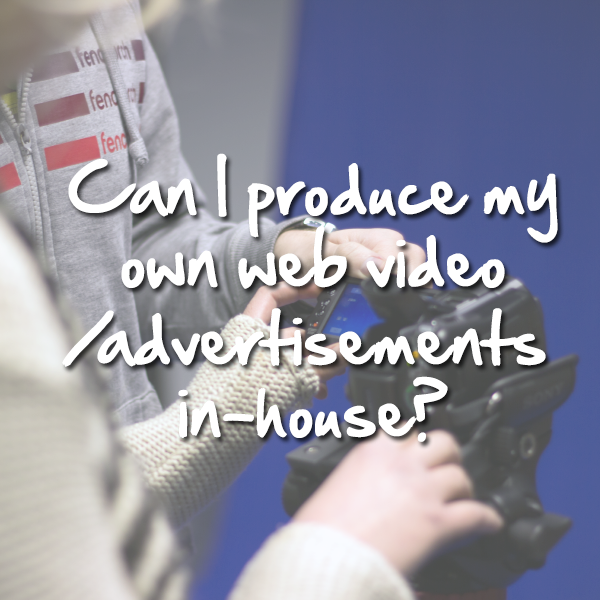
I am a member of several LinkedIn groups and recently someone posted a question. They had made their own in-house video – and to put it bluntly, it clearly wasn't their area of expertise. It was well, it was woeful (nice word, shame I have to use it). And they wanted to know if people liked the video, because the guys in the office thought this was fine, and why would you pay for professional expertise when cameras are so cheap now. So I wrote a response – and didn't post it, as it was too long and I didn't want to offend anyone (I was new to the group!). Well I naturally have strong views on the subject, and I will pose and answer the question this raised for me here, and hopefully you'll enjoy them and find them useful.
So here's the question (agony Aunt style): “Dear Ben, I have a camera and some editing software, and I know how to use them; Can I produce my own web video/advertisements in-house? Signed A B Zissman”
Dear A B, in answering this, I will give you my honest opinion. Be warned though – I am passionate on the subject!
First and foremost, I would answer the question as simply as possible; yes, of course you can produce your own video in house. The question that we should really be asking I think, is should you do so. And the answer to that is it depends how you want your brand to be viewed by your customers, your peers, and on what you want to achieve.
So here we go –
Part 1: Sound
The two basic elements anyone can name in successfully producing a video are the visuals and the audio, and the first thing that the inexperienced or the inexpert filmmaker does, pretty well every time, is forget that the audio is as important as the visuals. Seriously, it is. But without wanting to pick on anyone and specifically critique a particular video, I think I'll make a broader point. There are so many thousands of videos out there, and so many more being created and uploaded all the time. This is because from a business perspective savvy marketeers have long been in the know about the effectiveness of well made video. However, the fact that there is a lot of noise out there means the first thing you need to do in producing your video is to cut through this noise, and for that you have to understand how to target your video, and then how to produce something that will appeal to your intended audience.
The fact of the matter is, people switch off, or disengage from, or fail to take away and remember messaging from a video with poorly produced audio. If you want them to listen, for goodness sakes get the sound right. And a tip here – good post-production sound engineers will use what you do hear and what you don't hear to create the perfect effect.
A simple rule that so many people even now don't understand - sound recording should not be done through the intrinsic camera mic. “But what if” I hear you ask, “for aesthetic reasons I'm specifically going for the 'I made this at home' sound/feel?” Even then, you should record the best quality sound and use post-production to create this effect, giving you maximum control, because unless you're a sound expert, you won't get the effect right on the camera mic – you'll just get people switching off! Nor should your audio mixing be done by someone who frankly fails to recognise the importance of sound in the first place, and lacks the expertise to deliver. If you expect someone to take the time to watch and listen to your video, make it as compelling as possible, give them a reason to watch it – but at the very least, don't give them reasons to switch it off!
Part 2: The Visuals
And with visuals, please at least shoot at a quality that says “I care about this video”. If you don't, we the viewers will not care either. Yes, you can spend a couple of grand and get a decent full HD camera that shoots at 50 mb/s, but for the most part its the equivalent of buying a Ferrari Italia and putting it in the chimpanzee enclosure in the zoo. You're asking for trouble, and the odds are they won't use it right.
Mise-en-scene – a good phrase meaning, well a lot – essentially everything in your frame, the composition of all that you see on screen, from the lighting, the blocking – where people are stood – to the set, props – like I said, the whole shebang. Mise-en-scene literally means “put in the scene”, and it is absolutely key to telling any compelling narrative. It’s how you tell a story – and please believe me, everything you put on video needs a story. So understanding why something goes where, why your actors are placed here, why there is white space there, back light here, fill light there, soft edges here – its all part of what the viewer takes in, and it is a real skill to understand and direct things to achieve this. If you shoot in full HD (not usually needed for web delivery, but worth doing in terms of usage options) but your composition, lighting, blocking – whatever – is wrong, then you're selling your company short, because it won't work.
Lighting is important – key – to producing anything of real quality and you need to know how and why to use it, but if you are going to shoot low quality, lighting won't help much. The equipment you use is important. That said, its still probably only 10%, at the very most, of the battle in terms of making a video engaging. The rest is down to the filmmaker(s).
I told you I was passionate about this, so you'll have to forgive me.
Part 3: The Presenter and the Voiceover
An interjection here might well be; “But surely Ben, a simple talking head video can be produced in-house?” (I crowbarred this in here as the video which prompted this post was a talking head video).
If you're going for a very basic model of video, such as the talking head, the presenter needs to communicate through the screen directly to the viewer. Using people from within your business can be a good idea. BUT if you can't help them out with some nice visuals, a strong sound mix, a tight, engaging and succinct script, you need someone with immense charisma and a good director to help them through it, or a trained professional. It simply isn't fair to ask someone to pull it off if it isn't their forte, and certainly not if the production values are so low that much of your audience isn't listening anyway.
Common problems for non-professional presenters;
1) “Acting” - they will try and act, look like they are acting, and become clownish.
2) Remembering – if they have a script they need to learn, they will often look like they are remembering lines from it.
3) Delivery – it takes training, and more importantly years of practice, to become proficient as a presenter or voice over artist. If someone tells you they are the exception to this rule – trust me, they aren't.
4) Autocue – reading from an Autocue is not as easy as it sounds. Amateurs will tend to struggle with the combination of concentrating, delivering with the correct emphasis and appearing natural and at ease.
Part 4: The Conclusion
In a time of austerity, I completely understand why you might want to produce your own video rather than pay out for expertise, but I would say this; if it’s for your business, do it properly, and the minimum here is to use these sort of forums to get the right advice from experts. And I feel I must ask – why would you spend 5 or 6 days doing video when it isn't your core skillset? That's time you could be working with your customers, refining your own processes – or if you're like me, sitting back with a cold beer after 6 o'clock! Don't waste your time getting to a place where you're producing “not-as-bad-as-it-could-be” video, when you could be spending it more valuably. If you like playing with a flip cam or handycam, play about with it at home – it isn't good business, on the whole. For example, I'm not an expert cameraman, so I don't do camera work on our videos. I could, because I'm pretty good at it. But I don't and shouldn't.
All of that said, if you're going to do it yourself, ask for some advice, I and my fellow producers here at MWS are always happy to provide helpful advice. As a 5 point technical plan to getting it closer to right, here is what I would advise for anyone thinking of shooting in-house video – as a bare minimum.
1) Buy a camera that at least gives you a quality that shows you care about the end product.
2) Record the sound using an external condenser mic – the sound of the whirring camera screams “we didn't put much effort into this!” When you use something amateur to represent your business, it's dangerous territory.
3) No cut points and reading awkwardly from a script is being unnecessarily cruel to the presenter. One seemingly random cut point often says “I'm covering a mistake”. Even iMovie lets you cut and edit effectively.
4) Any effect, such as desaturation or going fully black and white for no apparent reason doesn't make your video any more classy. Any amateur with a home video camera has done this for a laugh – don't make your business a laughing stock.
5) Don't start the camera rolling until you have carefully targeted the video and know exactly; what you're going to shoot, why, and how you're going to measure the results (asking colleagues, friends and family if it's good doesn't count!). Otherwise, you're probably going to waste your time.
In summary: A B, yes you can shoot video yourself. And no, you probably shouldn't.
Ben
